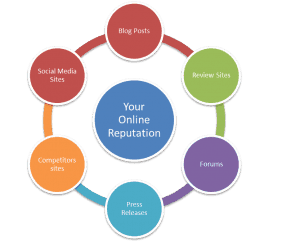Push Down Negative Results
Build a strong Social Networking & Reputation Buffer
Google is either your friend or worst enemy. In their own words, Google is “…the biggest kingmaker on this Earth”. Based on the Arab Spring and other recent world events, it is probably true. If so, then it follows that Google is also “the biggest humiliator on this earth”. After all, most businesses today stand or fall based on their Google search results.
The simple fact is if you do not take control of Google search results for your name, or your business name, then a competitor will probably do it for you, and that will almost always end badly.
 If you have a wooden home in the middle of a dry prairie, then one spark will burn everything down. But, if you plant green grass around the home, and cut back the dry tinder, then the chances of disaster are greatly diminished; so it is with online reputation management.
If you have a wooden home in the middle of a dry prairie, then one spark will burn everything down. But, if you plant green grass around the home, and cut back the dry tinder, then the chances of disaster are greatly diminished; so it is with online reputation management.
It is a must to publish and promote interesting, relevant, positive content containing your name, brand, and other important search terms. This fills up the first two or three pages of Google search results. This is no small task because Google has a mind of its own. But do not be discouraged. This site offers free help to reduce the toil and boredom that comes with this essential requirement of every business continuity and disaster recovery Plan (BCDR).
Don’t Neglect Search Results for You Or Your Business.
Even a company or individual who has absolutely nothing to do with the online world can find its/his/her credibility smeared by “Google Bombs”. Your business might not be online. However, your customers– as well as your rivals– are very active online. The first step in Online Reputation Control is to simply “Google yourself”. Google both your name and your business’s name to see what shows up. Or you can use our free analysis tool to make sure you see unbiased search results. Chances are, you’ll be surprised by the results.
It only takes one person to destroy your reputation today
 How you look in Google can be one of your best assets; or your worst nightmare. Why? Because first impressions matter to people.
How you look in Google can be one of your best assets; or your worst nightmare. Why? Because first impressions matter to people.
Before Google, an unhappy customer could tell 10, maybe as many as 100 people about their experience with you. But today, an unhappy client or even an unscrupulous competitor can influence countless people with social media, blogs and simple, often anonymous, submissions on review websites.
These poison-penned vandals will publicly accuse you of everything you’ve done, or haven’t done! When a disastrous online reputation is costing you both clients and revenue, then it’s time to do something about it.
Strike back to Online Attacks
According to Google’s research and published findings, content on Page 2 of Google search results, receives as only 6% of the exposure
that it would otherwise receive if it appears on Page 1 of the google search results.
From time to time, we come across an online reputation problem due to a fragile Google presence for the client’s name, brand or other important Google search phrase. And often this is because there is no strong reputation buffer in place.
A weak Google presence exists when the client has not adequately defended his/her name or brand with positive and relevant content for that exact search phrase. So when there is no reputation buffer and the malicious competitor attacks online and publishes false complaints about that person or their brand, those complaints will often dominate page 1 of Google search results. At that stage, it is essential to build strong social networking & reputation buffers to strike back to these online attacks. If there is not much positive material to work with, then even page1.me’s search remediation, and suppression services can have difficulty in taking back control of search results.
How to build your Reputation Buffer
1. Create Favorable Content
 Be visible anywhere you can, on your website, social media channels, blogs, etc. The search engines crawl ALL the content out there, including images and videos. So by publishing good, relevant online content that tastefully mentions your name or business name, you’re taking reasonable first steps to manage your own Google Search results.
Be visible anywhere you can, on your website, social media channels, blogs, etc. The search engines crawl ALL the content out there, including images and videos. So by publishing good, relevant online content that tastefully mentions your name or business name, you’re taking reasonable first steps to manage your own Google Search results.
BUT keep in mind that Google is clever and looks for unique, relevant content. So your content needs to be helpful and bring value to your target group’s needs and questions.
Publish content on:
- Facebook business pages;
- Google plus pages;
- Twitter pages that are
optimized for search results; - Pinterest pages;
- Instagram pages;
- Blogs;
- Search engine optimized site-maps for your website;
- Images about you or your products, that are optimized to appear in Google’s image preview provisions within search results;
- YouTube, video and other video services and channels for your name or brand;
- … and many other deliverables designed to help you take back control of such results for your name or brand.
REMEMBER: When posting messages, videos and tweets from your social networking accounts, try to include links to your existing positive search results or cross-link your other social networking accounts. This helps elevate your profiles in search results.
2: Decoy Personas
 For private, high net-worth individuals, we can create an effective decoy persona to help Google search to mind its own business. Our decoy services can confuse busy-body Google users so that they can’t find accurate background information about you, your family and your assets. Furthermore, these decoy projects can incorporate sophisticated surveillance services, where our digital investigations division can give you a heads up if you have a stalker. We preserve important digital breadcrumbs just in case you need to look back forensically. This is helpful if you come under attack financially, physically or corporately.
For private, high net-worth individuals, we can create an effective decoy persona to help Google search to mind its own business. Our decoy services can confuse busy-body Google users so that they can’t find accurate background information about you, your family and your assets. Furthermore, these decoy projects can incorporate sophisticated surveillance services, where our digital investigations division can give you a heads up if you have a stalker. We preserve important digital breadcrumbs just in case you need to look back forensically. This is helpful if you come under attack financially, physically or corporately.
3: Google Alert yourself and join the conversation
 Set up a Google Alert for your business or personal name, staff, products and trademarks. If you don’t know how, we wrote earlier about how to set up Google Alerts. Google will send you an automated email whenever it discovers new content that contains these words or phrases. This way, you will never miss anything. Furthermore, this early warning on new, emerging search results gives you the ability to respond, and take control if it is a reputation threat.
Set up a Google Alert for your business or personal name, staff, products and trademarks. If you don’t know how, we wrote earlier about how to set up Google Alerts. Google will send you an automated email whenever it discovers new content that contains these words or phrases. This way, you will never miss anything. Furthermore, this early warning on new, emerging search results gives you the ability to respond, and take control if it is a reputation threat.
A simple thank you goes a long way when someone discusses good things about you, but the hard part comes when responding to negative posts. Do not avoid them, because they can make or break you, just like your own response can. So make sure you respond responsibly and avoid responding in the heat of the moment. Every little comment you leave is an opportunity to develop your brand.
4: Be nice and Crush Complaints with Kindness
This might seem a bit hard to accept, particularly for those who struggle with pride issues, but it is important. Everyone (well, most) people know that negative people online are annoying, many of these individuals fall into three groups:
- People with legitimate concerns/opposing perspectives (thrust-worthy).
- People who always seem to find something to complain about.
- TROLLS: Usually, people with some type of personality disorder who take pleasure out of tormenting others, and for no legitimate purpose.
Crush with kindness! Confrontation and overly emotional or defensive responses are two qualities that often lose online. As mentioned before, do not respond in the heat of the moment, respond in a calm and friendly manner. If you’re good to people, people will be good to you… usually… trolls excepted). Before responding, have a look at our tips on how to respond to false reviews.
5: Collaborate with Likeable Names and Businesses.
 Do you have individuals or businesses within your personal or business network that:
Do you have individuals or businesses within your personal or business network that:
- Have influential blog sites that enable visitor uploading?
- Have an interview section for which you could be a guest?
- Anything else that increases your exposure to Google Search results? Come on… think outside the box!
These items of content will almost certainly help you, including:
- Generate more traffic to your site. Even if it’s just a few visitors, it’s a win.
- Creates more content that search engines can index
- Association/relationship with other trusted sources on the internet.
But remember; when you are going for Long-Term Relationships you need to offer them value as well; reciprocity is key here.
Have you tried and failed to fix your online reputation?
Page1.me can provide professional services which push down the negative search results that are causing you a bad reputation and help you control how you look in Google. Disappointed by reputation control companies? Let us explain why we are different.
No budget? Prefer to Do-It-Yourself?
Our team also published lots of free advice. On defamation911.org you can find free DIY and Self-Help material to help you manage your online reputation.
 Page1.me
Page1.me